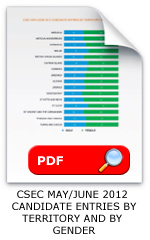![]()
![]()
![]()
Administration of the ExaminationThirty-five subjects were offered this year at the May/June sitting. Performance of CandidatesSixty-two per cent of the entries achieving Grades I –III, compared with 66 per cent of the entries achieved similar grades in 2011. The performance on individual subjects is reported below. ADDITIONAL MATHEMATICSThis subject was examined for the first time this year. Fifty-eight per cent of the candidates achieved Grades I–III. Candidates had challenges with some questions involving solving equations in index form in one unknown, vector geometry and probability theory. Candidates performed satisfactorily on the School-Based Assessment component of the examination. Generally, many of the projects submitted were of a high quality and related to real-world situations. Many showed a high level of ingenuity, and were obviously scenarios in which candidates were interested, for example, modelling the trajectory of a basketball to maximize the number of points that could be gained from free-throws. AGRICULTURAL SCIENCE (SINGLE AWARD)Candidate performance improved slightly with approximately 92 per cent of the candidates achieving Grades I–III for 2012 compared with 91 per cent in 2011. Candidates performed best on Profile 1, The Business of Farming. However, candidates continued to experience difficulties with questions which assessed their knowledge of practical skills in Profile 2, Crop Production, and Profile 3, Animal Production. AGRICULTURAL SCIENCE (DOUBLE AWARD)Approximately 91 per cent of the candidates achieved Grades I–III, compared with 93 per cent in 2011. The Examining Committee reported a significant improvement on Paper 02, the Structured paper, as well as on Profile 3, Animal Production. However, candidates had difficulties composing answers for the essay paper, Paper 03. BIOLOGYCandidate performance declined slightly with 72 per cent of the candidates achieving Grades I–III in 2012 as compared with 73 per cent in 2011. The Examining Committee reported that candidates continued to display weak experimental skills particularly in Planning and Designing, and to have difficulty in answering questions based on genetics. BUILDING TECHNOLOGYOption I: Woods Option II: Construction CARIBBEAN HISTORYThe revised syllabus in Caribbean History was examined for the second time in 2012. Generally, performance in the 2012 examination was fairly good. Seventy per cent of the candidates achieved Grades I–III compared with 74 per cent in 2011. Candidates generally performed well in Sections A and B of the syllabus but displayed some deficits in knowledge in Section C. Performance declined in Paper 02. Candidates needed to pay greater attention to the demands of the questions and exhibit a greater level of analysis and evaluation in answering questions which are specially designed to assess these abilities. Additionally, many candidates are still experiencing difficulty writing extended essays as required in Sections B and C of the paper. Performance also declined in Paper 03/2, the Alternative to the School-Based Assessment, as many candidates seemed not to possess the background knowledge required to engage fully with the questions asked. CHEMISTRYThe proportion of candidates achieving Grades I–III decreased to 58 per cent in 2012 from 64 per cent in 2011. The topic, Pollution and the Environment, was tested for the first time this year and candidates’ mean score on this question was the highest on Paper 02. Most candidates performed well on questions requiring knowledge of the mole, the periodic table, and drawing and interpreting graphs. However, candidates need to be more careful in using the terms and language of chemistry accurately. As noted in 2011, too many candidates performed below expectation on questions focusing on experiences that the syllabus required them to gain through laboratory exercises. Candidates and teachers are urged to use the laboratory exercises to reinforce, illustrate or clarify theoretical concepts. Additionally, greater attention needs to be paid to the planning and design skill in the school based assessment. CLOTHING AND TEXTILESThere was improved performance in 2012 when compared with 2011. Eighty-seven per cent of the candidates achieved Grades I–III compared with 81 per cent who achieved similar grades in 2011. There was improvement in candidates’ knowledge and their application of key concepts in the discipline. However, candidates continued to encounter challenges in relating their responses to the specific circumstances of the questions. In addition, the ability to provide the sequential steps in critical procedures in the subject proved challenging to some candidates. Performance on the School-Based Assessment component of the examination continued to be satisfactory. ECONOMICSPerformance of candidates declined slightly when compared with that of 2011. Sixty-five per cent of the candidates achieved Grades I–III compared with 71 per cent in 2011. Candidates’ performance improved marginally on Paper 02, the Structured Response paper. Candidates demonstrated a good understanding of basic micro and macro-economic concepts but had difficulty with analyses and interpretation of numerical data. Simple computations continue to be a challenge for majority of candidates. ELECTRICAL AND ELECTRONIC TECHNOLOGYSixty-five per cent of the candidates achieved Grades I–III compared with 44 per cent in 2011. Improvement was noted in candidates’ performance on all three papers — Paper 01, the Multiple Choice paper, Paper 02, the Structured Response paper and Paper 03, the School-Based Assessment. ELECTRONIC DOCUMENT PREPARATION AND MANAGEMENTEighty-nine per cent of the candidates achieved Grades I–III compared with 85 per cent in 2011 and 91 per cent in 2010. The performance on Profile 2, Speed, was consistent with 2011 and 2010, while there was an improved performance on Profile 3, Presentation and Use of Technology. However, there was a decline in the performance on Profile 1, Accuracy. This year there was a moderate improvement on the performance on Paper 01, the Structured paper which tests the theoretical aspects of the syllabus. The concepts which proved most challenging included the components of the computer system, file security and integrity and preparation of financial statements. ENGLISH APerformance in English A declined in June 2012. Forty-seven per cent of the candidates achieved Grades I–III. This was a fall-off in performance from the 67 per cent achieved in June 2011. There was a marked decline in the performance on Profile I – Understanding, and on Profile II – Expression. In Paper 02, the questions set for summary and literary comprehension generally elicited unsatisfactory levels of performance. ENGLISH BThe 2012 June English B examination was the first sitting using the revised syllabus. Approximately 68 per cent of the candidates achieved Grades I–III in 2012 compared with 71 per cent in 2011. Performance on Profile 1, Drama, was consistent with that of 2011. Performance on Profile 3, Prose Fiction, was also similar with performance in 2011, while performance declined on Profile 02, Poetry. The Examining Committee has recommended that the Subject Report as well as the Exemplars (particularly in the area of poetry) that are available on the website for this subject be consulted and used in preparation for the English B examinations. There is also need for candidates to be taught to base their inferences on a careful reading of the evidence in the texts/excerpts as a whole, and to display meaning making strategies that come from thoughtful processing of the events described. FOOD AND NUTRITIONEighty-nine per cent of the candidates achieved Grades I–III compared with 92 per cent in 2011. Candidates’ performance on Paper 01, the Multiple Choice paper, Paper 02, the Theory paper and Paper 03, the School-Based Assessment, was comparable with that of 2011. FRENCHSeventy-four per cent of the candidates achieved Grades I–III in 2012 compared with 75 per cent in 2011. While there was a marginal improvement in performance on Paper 02, the Free Response paper which assessed candidates’ ability to write the language, conversely there was a marginal decline in candidates’ performance on Paper 01, the Multiple Choice paper which assessed listening and reading skills, and Paper 03, the oral which assessed listening and speaking skills. General weaknesses centred on candidates’ analytical skills. GEOGRAPHYOverall, candidates’ performance remained fairly consistent with that of last year with approximately sixty-five per cent achieving Grades I–III. However, there was improvement in the percentage at the Grade I level, moving from four per cent in 2011 to six per cent this year. While the performance on both Paper 01, the Multiple Choice paper, and Paper 02, the Extended Response paper, continues to improve there is still the concern that candidates continue to perform poorly on the question which tests map reading skills, and on the use of knowledge. HOME ECONOMICS MANAGEMENTApproximately eighty-four per cent of candidates achieved Grades I–III in 2012 compared with eighty-nine per cent in 2011, representing a decline in performance. This decline in performance was seen across all profiles and papers. Despite this, however, there was noticeable improvement in the quality of response, particularly on questions which tested use of knowledge. HUMAN AND SOCIAL BIOLOGYCandidate performance declined in 2012, with approximately 56 per cent of the candidates achieving Grades I–III, compared with 63 per cent in 2011. While candidates were able to recall facts, they were challenged by questions requiring the ability to use their knowledge, particularly of the endocrine system, and active and passive immunity. INFORMATION TECHNOLOGYThis was the third May/June examination based on the revised syllabus. Candidate performance improved quite appreciably with eighty-three per cent of the candidates achieving Grades I–III compared with 79 per cent in 2011. Candidates performed better on Paper 01, Multiple Choice paper in 2012 than in 2011 but performance on Paper 02, Structured Response paper remained stable compared with that of 2011. Performance on Profile 3, Problem-Solving and Programming, showed significant improvement over that of last year. Questions on Profile 1, Theory, posed a challenge to candidates. INTEGRATED SCIENCEEighty-one per cent of the candidates achieved Grades I–III compared with 74 per cent in 2011. There was an improvement in the candidates’ performance on Paper 01, the Multiple Choice paper and Paper 02, the Theory paper. Candidates’ performance on Paper 03, the School-Based Assessment, was comparable with that of 2011. MATHEMATICSThe performance in 2012 was consistent with that of 2011. Thirty-four per cent of the candidates who wrote the examination achieved Grades I–III in 2012 compared with 35 per cent in 2011. The performance on Paper 01, the Multiple Choice paper and Paper 02, the Extended Response paper was also consistent with performance in 2011. Candidates continue to experience challenges with basic mathematical concepts such as perimeter, area, profit and loss, which are normally taught at the lower secondary level. MECHANICAL ENGINEERING TECHNOLOGYSeventy per cent of the candidates achieved Grades I–III compared with 56 per cent in 2011. Evidence of improvement was observed in all aspects of the papers and profiles except Profile 2, Application of concepts and principles in the solution of problems. MUSICApproximately 65 per cent of the candidates achieved Grades I–III compared with 66 per cent in 2011. The Examining Committee is concerned about the low performance on Profile 3, Composing, and the apparent lack of preparation of some candidates. OFFICE ADMINISTRATIONThere was a decline in candidate performance with 78 per cent of the candidates achieving Grades I–III compared with 88 per cent in 2011. The decline was most evident on Paper 02, Extended Response, where candidates experienced difficulties with questions which tested conceptual issues in some key modules such as records and file management. Candidates’ performance on Paper 01, the Multiple Choice, Paper 031, the School-Based Assessment, and Paper 032, the Alternative to the School-Based Assessment was comparable with that 2011. PHYSICAL EDUCATION AND SPORTPerformance was comparable with that of 2011with ninety-eight per cent of the candidates achieving Grades I–III in both years. Performance on Paper 01, Theory, was better than that of last year but still below that of 2010. Candidates had challenges in transferring theoretical knowledge into practice. PHYSICSThere was an improvement in the overall performance of candidates in this year’s examination over 2011. The percentage of candidates who achieved Grades I–III was 76 per cent compared with 74 per cent in 2011. Candidates had challenges with some questions involving calculations. Candidates continue to perform satisfactorily on Paper 03, the School-Based Assessment. PRINCIPLES OF ACCOUNTSThere was a decline in the percentage of candidates achieving Grades I–III in 2012. Fifty-six per cent of the candidates fell in this grade band compared with 69 per cent in 2011 and 65 per cent in 2010. Performance on Paper 01, the Multiple Choice paper, Paper 031, the School-Based Assessment, and Paper 032, the Alternative to the School- Based Assessment was consistent with 2011. However, there was a significant decline in the performance on Paper 02, the Essay paper, which contributed to the overall decline in performance. PRINCIPLES OF BUSINESSEighty-one per cent of the candidates achieved Grades I–III compared with 78 per cent in 2011 and 80 per cent in 2010. There was an improvement in the performance of candidates on Paper 01, the Multiple Choice paper. Performance on Paper 02, the Essay paper and Paper 031, the School-Based Assessment was consistent with 2011. Performance on Paper 032, the Alternative to the School-Based Assessment declined from 2011. RELIGIOUS EDUCATIONThe 2012 Religious Education examination was the first sitting of the revised syllabus. Four Options were offered for examination: Christianity, Hinduism, Islam and Judaism. Overall, there was a four per cent decline in the number of candidates achieving Grades I–III. In 2012, approximately 84 per cent of the candidates achieved Grades I–III compared with 88 per cent in 2011. Performance in Profile 2, Interpretation and Analysis, was consistent at the upper grade levels with that of 2011. However, performance in Profile 1, Knowledge, and Profile 3, Application, registered a decline at the same grade levels. The Examining Committee recommends that teachers familiarize themselves even more with the requirements of the new syllabus and in particular the requirements of the School-Based Assessment. SOCIAL STUDIESThe overall performance for 2012 was consistent with that of 2011 as approximately seventy per cent of candidates achieved Grades I–III. This consistency in performance was seen across all papers and all profiles. However, there is still a general weakness in candidates’ ability to provide more detailed explanations and relevant examples as required by questions on Paper 02. SPANISHSixty-seven per cent of the candidates achieved Grades I–III, a similar percentage to what obtained in June 2011. Performance of candidates on all the papers — Paper 01, the Multiple Choice paper, which assessed the listening and reading skills, Paper 02, the Free Response paper, which assessed candidates’ ability to write the language, and Paper 03 the oral, which assessed the listening and speaking skills, was comparable with that of 2011. TECHNICAL DRAWINGOverall performance declined when compared with 2012. Sixty-five per cent of the candidates who wrote the examination in 2012 achieved Grades I–III compared with 71 per cent in 2011. Candidates’ performance was consistent on Paper 01, the Multiple Choice paper, Paper 02, Plane and Solid Geometry, and Paper 04, the School-Based Assessment with that of 2011. However, candidates’ performances on the optional papers — Paper 031, Building Drawing, and Paper 032, Mechanical Engineering Drawing declined. Candidates need to focus on improving line-work, dimensioning and labelling which enhance drawing presentation and on ensuring that they adhere to standard drawing practices. THEATRE ARTSThis was the first examination using the revised syllabus for Theatre Arts. Overall performance at Grades I–III showed a 3 per cent increase compared with that of 2011. Approximately 90 per cent of the candidates achieved Grades I–III compared with 87 per cent in 2011. There was significant improvement in performance in Profile 1, Analysing and Appreciating, and Profile 3, Creating, while performance in Profile 2, Performing, was consistent with that of 2011. The Examining Committee has recommended that teachers provide greater support to the students in their preparation for the Paper 01 examination. They should also ensure that the students are exposed to live theatre which will enhance their preparation for examinations. VISUAL ARTSThis was the second examination for the revised syllabus. Overall there was an eight per cent increase in the number of candidates achieving Grades I–III. Sixty-eight per cent of the candidates achieved Grades I–III compared with 60 per cent in 2011. The percentage of candidates at each of the top three levels increased. Performance also improved in five of the eight Expressive Forms — Drawing, Painting and Mixed Media, Graphic Design, Textile Design and Manipulation, and Leather Craft. While performance in Printmaking was consistent, there was a decrease in performance in Sculpture and Ceramics and Fibre and Decorative Arts. |






